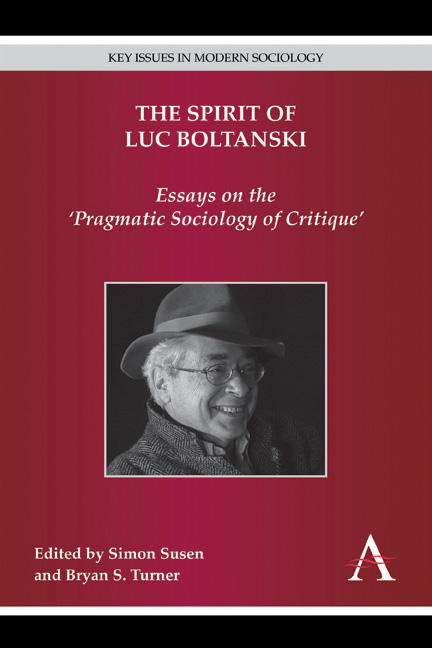Book contents
- Frontmatter
- CONTENTS
- List of Contributors
- Preface
- Part I Introductory Remarks
- Part II Luc Boltanski and (Post-) Classical Sociology
- Part III Luc Boltanski and Pragmatism
- Part IV Luc Boltanski and Critique
- Part V Luc Boltanski and Critical Sociology
- Part VI Luc Boltanski and Political Sociology
- 12 The Promise of Pragmatic Sociology, Human Rights, and the State
- 13 ‘The Political’ in the ‘Pragmatic Sociology of Critique’: Reading Boltanski with Lefort and Castoriadis
- 14 Axel Honneth and Luc Boltanski at the Epicentre of Politics
- 15 The Civil Sphere and On Justification: Two Models of Public Culture
- 16 Luc Boltanski in Euroland
- 17 Reflections on the Indignation of the Disprivileged and the Underprivileged
- Part VII Luc Boltanski and Contemporary Issues
- Part VIII Luc Boltanski in Conversation
- Part IX Luc Boltanski and His Critics
- Index of Names
- Index of Subjects
13 - ‘The Political’ in the ‘Pragmatic Sociology of Critique’: Reading Boltanski with Lefort and Castoriadis
from Part VI - Luc Boltanski and Political Sociology
Published online by Cambridge University Press: 05 December 2014
- Frontmatter
- CONTENTS
- List of Contributors
- Preface
- Part I Introductory Remarks
- Part II Luc Boltanski and (Post-) Classical Sociology
- Part III Luc Boltanski and Pragmatism
- Part IV Luc Boltanski and Critique
- Part V Luc Boltanski and Critical Sociology
- Part VI Luc Boltanski and Political Sociology
- 12 The Promise of Pragmatic Sociology, Human Rights, and the State
- 13 ‘The Political’ in the ‘Pragmatic Sociology of Critique’: Reading Boltanski with Lefort and Castoriadis
- 14 Axel Honneth and Luc Boltanski at the Epicentre of Politics
- 15 The Civil Sphere and On Justification: Two Models of Public Culture
- 16 Luc Boltanski in Euroland
- 17 Reflections on the Indignation of the Disprivileged and the Underprivileged
- Part VII Luc Boltanski and Contemporary Issues
- Part VIII Luc Boltanski in Conversation
- Part IX Luc Boltanski and His Critics
- Index of Names
- Index of Subjects
Summary
Whilst a political dimension was perhaps not at the forefront of Luc Boltanski and Laurent Thévenot's ‘sociology of critical capacity’, as most prominently articulated in On Justification (2006 [1991]), it can be argued that their work engages with important questions regarding ‘the political’ and politics. In this chapter, I shall make the political dimension in French pragmatic sociology more explicit and shall explore a tendency to ‘politicization’ of pragmatic sociology in some more recent works of Luc Boltanski. This is done with an eye to what I see as a normative dimension in pragmatic sociology that links it with (radical) democratic theory. It seems fruitful to expose this normative dimension by reading Boltanski's On Critique (2011 [2009]) together with the work of radical democratic thinkers, in particular those of Claude Lefort and Cornelius Castoriadis. Lefort and Castoriadis have both – even if in different ways – contributed significantly to a deeper understanding of politics through a notion of ‘the political’. Thus, I seek to bring out dimensions which are shared in the works of Boltanski, Lefort, and Castoriadis and which, furthermore, concern the relation between ‘the world’ and ‘reality’, reflections on the political form of society, and issues of uncertainty and indeterminacy.
In this chapter, I shall first discuss the notion of ‘the political’, including the question of how it relates to pragmatic sociology, and subsequently engage in a close reading of Boltanski's On Critique with the help of insights from Lefort and Castoriadis. In the concluding section, I shall briefly explore how the three authors deal with what seems to be an age in which politics is in significant decline.
‘The Political’
Boltanski and Thévenot's ‘sociology of critical capacity’ understands social realities to be grounded in a plurality of possible ways of engaging with the world and of justifying individual actions. Such a pluralistic approach is contrasted to what could be called the monism, or at most dualism, of much normative political theory in defining the just – for instance, emphasizing social justice and recognition.
- Type
- Chapter
- Information
- The Spirit of Luc BoltanskiEssays on the 'Pragmatic Sociology of Critique', pp. 369 - 390Publisher: Anthem PressPrint publication year: 2014

